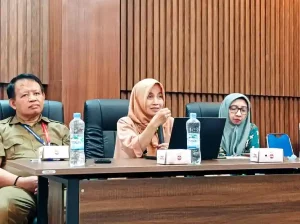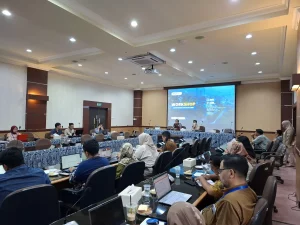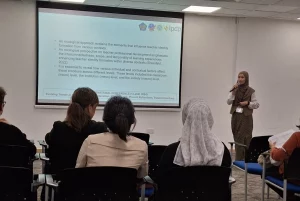The word corpus may sound foreign to our ears, especially for those who are not linguists. The corpus is an authentic collection of texts, both written and transcript in large numbers that are stored electronically. It has often been used in various areas of linguistic research, including translation, forensic linguistics, discourse analysis, and teaching.
The advantage of the corpus is that it is easy to access, and corpus-based analysis can be made quantitatively generalized. In the realm of teaching, the corpus can be a source that provides descriptive data about how language is used that can be used by teachers or students as a medium to find evidence or confirm their intuition about the knowledge of a language. One of the uses of the corpus in the world of pedagogy is to learn synonyms.
Synonyms are important parts of linguistics because we can express the same ideas, but in different language expressions using synonyms. However, according to some linguists, synonyms cannot always replace one another.
Using the synonymous words to convey something will be difficult to get the exact meaning of the original word or the intention of the speaker, especially for students who study foreign languages like English. They are not native speakers who have the privilege to choose the right words intuitively.
Several studies have shown that the use of a corpus is useful in knowing the level of similarity and difference in identical words or synonyms. For example, Prof. Dilin Liu and Maggie Espino found that there are different uses of four identical adverbs: actually, genuinely, really and truly that are not described in a dictionary or reference book. The word, for example, is most often used to describe evaluative adjectives, while genuinely and genuinely are more commonly used to modify adjectives and verbs of emotion, attitude, desire or cognition.
Our research on synonymous adjectives also showed the same findings. We use the National Corps of Great Britain or better known as the British National Corpus (BNC) as data.
BNC contains 100 million written and oral texts from various writing genres so that it can be considered a representation of British English. The same adjectives that we examined are adjectives that are very well known by English students, namely: skinny, slim and thin. Many English learners may already remember some findings or at least validate their intuition. For example, the word thin has a neutral expression, and slim tend to carry a positive connotation. On the other hand, skinny is often used by speakers when they want to degrade or reproach.
However, some findings may still be rarely known. For example, unlike skinny, which modifies many nouns that are related to living things, slim is more heterogeneous because it can also modify non-living nouns. When slim explains inanimate nouns, slim often expands its meaning to a metaphorical expression meaning small, as in the sentence “the chances were slim “ which means the chance is small. Thin is also used in many idiomatic expressions such as in the phrase “thin argument” which means weak arguments rather than thin arguments, or in the phrase “through thick and thin” where thin means “difficult situation”.
The results of this research imply that the use of the corpus is very useful for studying the context in which words that have identical meanings are usually used to avoid unwanted implications and connotations. In connection with teaching English synonyms, the corpus can be an effective learning medium. Much information not found in dictionaries can be learned using the corpus.
The corpus can also encourage students to learn independently because it can be accessed anywhere. However, the amount of language information that we can get from the corpus may not be entirely suitable for all levels of students. Beginner English students can feel overwhelmed absorbing all the information at once.
Moreover, the use of corpus requires offline or online software can also be an obstacle for students who are not yet familiar with the technology. Therefore, instructors are advised to be able to master the software interface and be able to filter data that is less relevant to be given to facilitate students.
Author: Muchamad Sholakhuddin Al Fajri
Details of research available at:
Islamiyah, M. & Al Fajri, M. S. (2019). Skinny, Slim, dan Thin: Analisis Berbasis Korpus Kata Sifat Identik dan Implikasinya Pada Pengajaran Bahasa Inggris. Ranah: Jurnal Kajian Bahasa, 8 (1), 19-32. doi: https://doi.org/10.26499/rnh.v8i1.894









